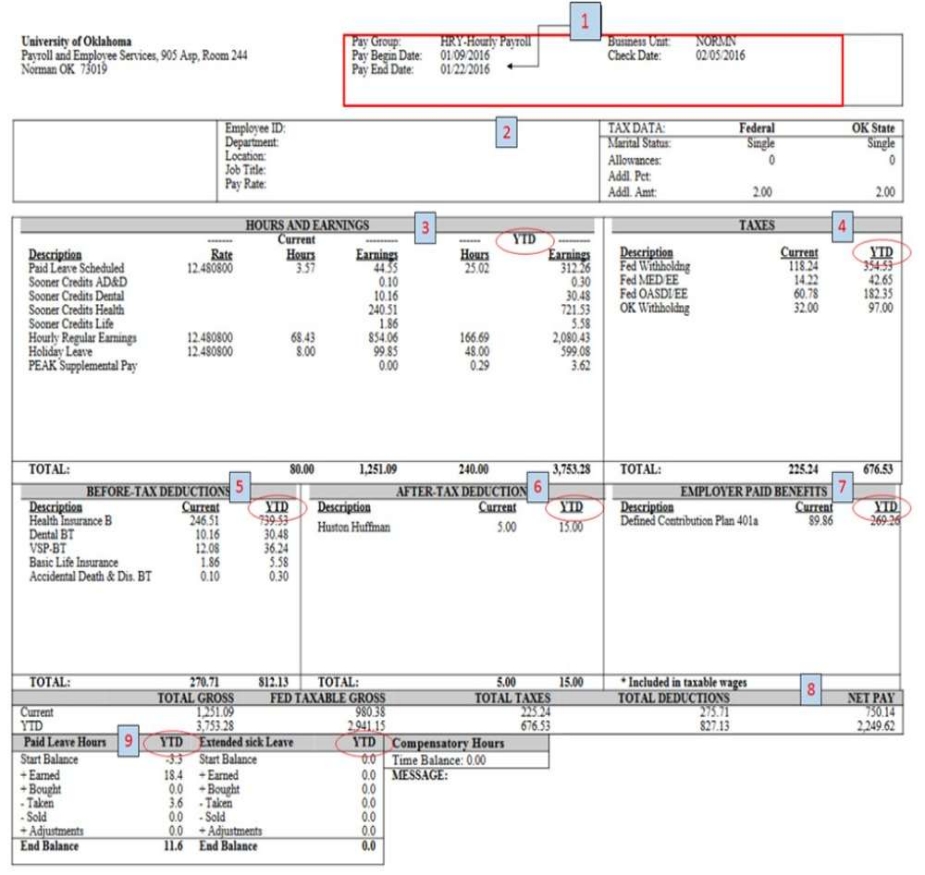Sample Check Stub

Paycheck Stub Key:
Pay Period Begin and End Dates list the time period for which you are being paid. Check date is the date of disbursement.
The Employee Information & Tax Data sections show your employee ID, Department/location, tax status for federal and state taxes, your marital tax filing status, the allowances you have claimed, and any additional amounts you request to be withheld.
The Hours and Earnings section lists your earnings information by type for the Current Pay Period and Year-to-Date. Rate, Hours, and Earnings are displayed. Earnings types include, but are not limited to:
- Regular Earnings (including sick leave, vacation and family leave)
- Other Earnings (such as Overtime, Supplemental Compensation, Staff Awards and Bonus pay)
- Retroactive payments
- Adjustments (which can be a positive or negative amount, depending upon the adjustment being made)
- Sooner Credits, which are the portion of your benefits paid by the university for eligible benefits: Health Insurance, Dental, Accidental Death & Dismemberment (AD&D), and Life Insurance.
The Taxes section is a breakout of the taxes withheld for the Current Pay Period and Year-to-Date. It includes federal withholding, Medicare, Social Security, and State Taxes.
Before-Tax Deductions are deducted from your gross pay before applicable taxes taxes are calculated thus reducing your tax liability. The deductions are listed for the Current Pay Period and Year-to-Date. Pre-tax deductions include medical, dental and vision premiums, retirement contributions for the Oklahoma Teachers Retirement System (OTRS), pre-tax retirement service credit purchases, Flexible Spending Account contributions, and other deductions. See Deductions more information.
After-Tax Deductions are the deductions taken from your earnings after taxes have been calculated and withheld. The deductions are listed for the Current Pay Period and Year-to-Date. See Deductions for more information.
The Employer-Paid Benefits section shows you how much the university pays for your benefits. You will see costs listed for the Current Pay Period and Year-to-Date. This is NOT a deduction from your earnings.
Net pay is total amount of pay disbursed after all payroll calculations and deductions for the pay cycle have been made. This is your take home pay.
This section displays your Current and Year-to-Date vacation, sick time, and compensatory leave (if applicable) balances.
Lost, Damaged or Stale Dated Paychecks
Lost, Damaged or Stale Dated Paychecks
If you have picked up your paycheck and you are unable to find the check, or your check has been damaged or destroyed, email Payroll at payroll@ou.edu. In your email please include the check number, amount of the check, check date and your name as listed on the check along with your contact information.
If your paycheck was issued and was not cashed within 90 days of the issue date, email Payroll at payroll@ou.edu. Please provide your name as listed on the check along with your contact information.
Warrants are issued by the Office of State Finance and take approximately 10 to 15 working days.
Timesheets
Timesheets for hourly and salaried Norman employees are provided in below.
- Hourly employees should record the time worked and leave taken during each pay period in WorkForce (time.ou.edu).
- Salaried employees should record leave taken each pay period in WorkForce (time.ou.edu).
Note: Timesheets must be submitted by the employee and approved by the supervisor.
Payroll Deductions
There are two types of payroll deductions that are withheld from an employees paycheck - voluntary and involuntary.
Voluntary deductions are deductions an employee voluntarily agrees to have deducted from their paycheck. Examples include your cost for benefit coverage and deductions you have requested for parking, United Way, etc.
- Athletic tickets - OU Ticket Office
- Donations to United Way - United Way
- Donations to OU - OU Development Office
- University Benefits - Insurance & Retirement programs
- Parking passes - OU Parking & Transportation Services
- Fees for the Houston Huffman Recreational Center or the University Health Club - OU Fitness & Recreation
Involuntary deductions are those which the University of Oklahoma and the employee has no control. The university is required by law to deduct and remit a certain amount from the employee's pay to satisfy an employee's debt. Examples of involuntary deductions include; child support, tax levies, garnishments, defaulted student loans, and bankruptcy payments.

